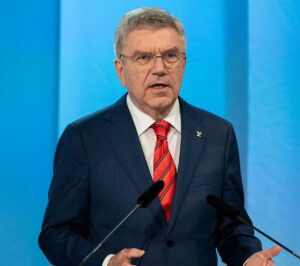The International Olympic Committee (IOC) has launched the Olympic AI Agenda. The initiative was introduced during an interactive event held at Lee Valley VeloPark at Queen Elizabeth Olympic Park, home of the Olympic and Paralympic Games London 2012
The Olympic AI Agenda is the third in a trilogy of strategy documents. It follows Olympic Agenda 2020, launched in December 2014, and Olympic Agenda 2020+5, launched in March 2021. It sets out the envisioned impact that Artificial Intelligence (AI) can deliver for sport and how the IOC intends to lead on the global implementation of AI within sport. It establishes the IOC’s ambition and guiding principles, identifies high-impact areas for AI application, and explores the framework and governance mechanisms needed to mitigate risk and promote the responsible use of AI. It outlines four commitments that the IOC has made as it takes the first steps in integrating AI into the Olympic ecosystem and leveraging the power of AI in its operations, in the Olympic Games and across the Olympic Movement.
-When we launched Olympic Agenda, our comprehensive reform programme, in 2014, we did so under the slogan ‘change or be changed’– for some of you here in Great Britain this may sound familiar, it’s about ‘To be, or not to be? That is the question”. Today we are making another step to ensure the uniqueness of the Olympic Games and the relevance of sport, and to do this, we have to be leaders of change, and not the object of change, said IOC President Thomas Bach at the event in London.
Mr Bach continued:
-At the centre of the Olympic AI Agenda are human beings. This means: the athletes. In sport, the performances will always have to be delivered by the athletes. The 100 metres will always have to be run by an athlete – a human being. Therefore, we can concentrate on the potential of AI to support the athletes. AI can help to identify athletes and talent in every corner of the world. AI can provide more athletes with access to personalised training methods, superior sports equipment and more individualised programmes to stay fit and healthy. Beyond sporting performance, AI can revolutionise judging and refereeing, thereby strengthening fairness in sport. AI can improve safeguarding in sport. AI will make organising sporting events extremely efficient, transform sports broadcasting and make the spectator experience much more individualised and immersive.
During a 90-minute interactive session, experts from the fields of sport, technology, business and academia discussed the practical application of AI tools to sport and their implementation.


